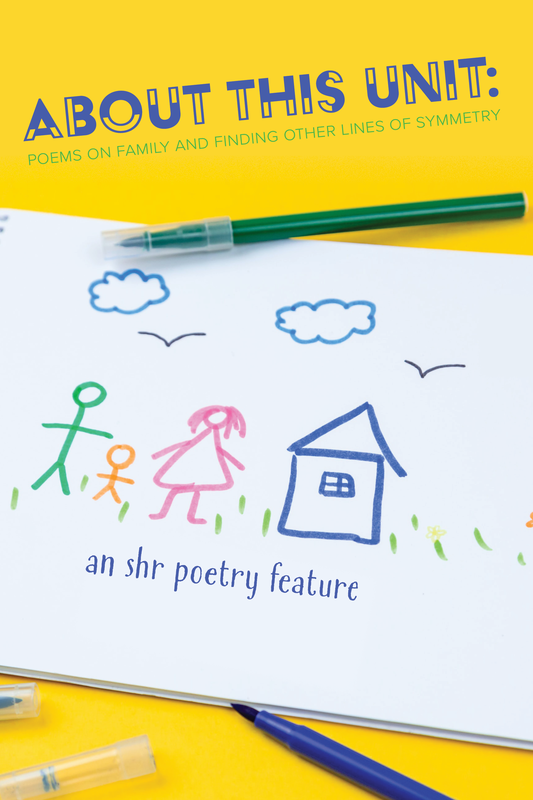|
Vertical Divider
Atlanta, GA
My God, what is a heart? —George Herbert This far east it was a different town when they’d ride out for milkshakes in the 50s. Charmingly rundown now, the businesses (not a few, brunch spots) snaking down the hill were ripe for developing. A City Hall famed for squat square footage was already a designer mall in someone’s mind. ♦ Freedom Parkway’s redbuds had just gone off, with the Pears lining Ponce de Leon, which Mom still called Poncey, close behind. We were beginning in that new millennium to ease into a friendship as fragile as my early-twenties hangover (what is it to be southern, anyway, but to trust in the salve, the grace of grease?). Out here, for an afternoon and a few others like it, she ate what she wanted. ♦ We hadn’t been so free with each other since I was very young, like old friends reuniting. She was open about smoking— a little—again. About her attraction to the owner, a man with meat on him and gold chains in his chest hair, whose son had OD’d. I let go and told her how though the girl I loved had moved I saw her everywhere. The pain of thinking that we didn’t have a chance resolved in the mutual call of appetite, abandoning our bodies to the breaking of the pancakes’ lacey edge together. ♦ We were only down the road but were as far as we could get from her apartment, its unassuming brick a postwar affair made when she was, and which we shared miserably that year, her last. I was just starting to move out. She liked that the ceilings, at least, were high, high enough, anyway, not to embarrass her cast-off inheritance of heavy furniture, wingbacks and dressers, a dining room table and chairs and sideboard missing a leg she called with High-Church flair a credenza—broken cupboard of her mother’s faith, her father’s credit: wood she hated but wanted, like her body, a certain way. Every old stick of which I’d moved returned us to a past we never intended to revisit—or to revisit on each other, a rehearsal of ruin worked out in food: her mother’s prowess, my father’s about-face in 1980 or so, when grease proved a culprit in heart disease. Still, she persisted fixing me the quick, filling suppers of my youth, balanced on the tooth of my ingratitude. Late, alone, she ate her pile of roasted cabbage and blackened brussels doused in soy sauce and read and did not want to be disturbed. That she had trouble swallowing, as much as she’d admit. ♦ Old or new, white money was back—or wanted to be taken back, abusive husband, having fled in the 60s (when Mom went off to college), like her dad coming back from Florida to remarry her mom on her deathbed. Waltzing in like it owned the place, it would be made to wait. ♦ Out here, we could get out from under each other: corporate margin almost New Orleans in its mild air of age and license, little seam of Ponce, in French, of thought she could have quipped, a going all along, a little room, a little Rome. ♦ On a Post-It over the sink was once written “Think @ 10 am” in her immaculate hand. It meant to remember each other, like a ring’s reminder to a single mother and her three disbanded teens. This was in the house on Montevallo, her first. A mindless, overqualified hour into some shit job, the printer, the pizza parlor, a moment saved, a little ceremony, like a midmorning smoke or a sip of water between classes. ♦ The spring teased and nudged us out, like being introduced to her 90-year-old neighbor— Milton, was it? His was the first unit off the slightly musty, worn-carpeted hall (hers was at the end on the right). He came to the door like he’d been waiting and took my hand, a prospectless, begrudging scrub living with his mother after college. His eyes shone at the gates of bone, so lucid I couldn’t look away, so even I could see he liked what he saw: that he could espouse how she must be so proud, how handsome I was. ♦ Everything was agreeable: the weather, the bacon, our waiter. Almost pretty in all black, there was something a touch— touchingly—melancholic about his east Atlanta mystique that you’d call hipster now, where emo met rockabilly’s ragged edge. He reminded Mom, of all things, of Michael Jackson in—what else? ♦ Remnant of Little Richard, blur of James Brown’s loafers, spark from her disco days. Glitter, and curl, and wind— she loved to watch him dance, his facelift taunting her that she was outta time while he was outside of it: 50s Michael we needn’t be told isn’t like other guys, 80s Michael in that amazing vented red patent leather jacket with the ribbed shoulders and black tunic V a new kid showed up in in Kindergarten, his name a shape no one could guess (not Circle or Heart or Square) before he made his entrance. Time the creature creeping up behind, like a father or a brother or an uncle reprised in a son. Green Michael, grave Michael, death’s head Michael calling from within, or crawling out of Oakland Cemetery’s jumbled vaults after the tornado desegregated them. ♦ It made no sense, he was white. But why not? Like a holidaying parent (when in Rome), I let her have it, I let it slide down our throats. Maybe the cheekbones, I told myself, maybe the frame. ♦ Conquistador or revolutionary from the pages of history, thirty-years-ago-drawn with fabric crayons and brought home for Mom to sew onto this cushion, his hair coiffed into a helmet, his brown skin and nose showing signs of revision, his epaulets like cupcakes on his shoulders, there is no telling who he was supposed to be. But she would always see the King of Pop—or Pomp— in his sequined Grammys marching band getup. ♦ What is an icon but a likeness? ♦ Behind us, a cook was starting shit, or finishing it, laying into our little Thriller hell-for-leather. Backed against the wall, he flinched and wilted to the tall cook’s delight. Did she see it? In my mind I hide it from her, but in truth I can’t remember. The padded kitchen door swung shut. I could see him crying through the diamond. ♦ In an old nightmare, burnt black in a crash, it was Mom’s thumb on a cushion our maid’s Black hands offered up. ♦ Our waiter was only wearing black. ♦ His was a kind of misfit performance she delighted in, even while condemning it in my friends, as if she were trying to keep me off the scent of what she felt she really was. To have done what was done. ♦ She’d have sympathized with Michael’s twisted proclivities, twisted up in a childhood, which, like hers, never existed. So she insisted on playing the witch in that same classroom. Under the cover of darkness serving up fruit punch to the little goblins and princesses and superheroes, her cauldron steaming with dry ice we had to drive to a factory on the Black northside of Birmingham to buy. ♦ And if, like Michael’s gleaming suit on the cover, in some sense, she saw all servers as Black, as servants? She served me my whole life. ♦ Michael’s hair, larded and flammable, his blood-red jacket threatening to turn into a sports car at any moment, his child voice incommensurate with his sadistic glee, cup after cup of thin coffee and the rarity of really eating with her, a fortune made by starving a large one, Love’s conquistadors and victims, his rejects and stars: sup with us, forgive us, we ate, we ate our hearts out, as Love wept. |
About This Unit: Poems on Family and Finding Other Lines of Symmetry |
AUSTIN SEGREST is the author of Door to Remain, winner of the 2021 Vassar Miller Prize.


